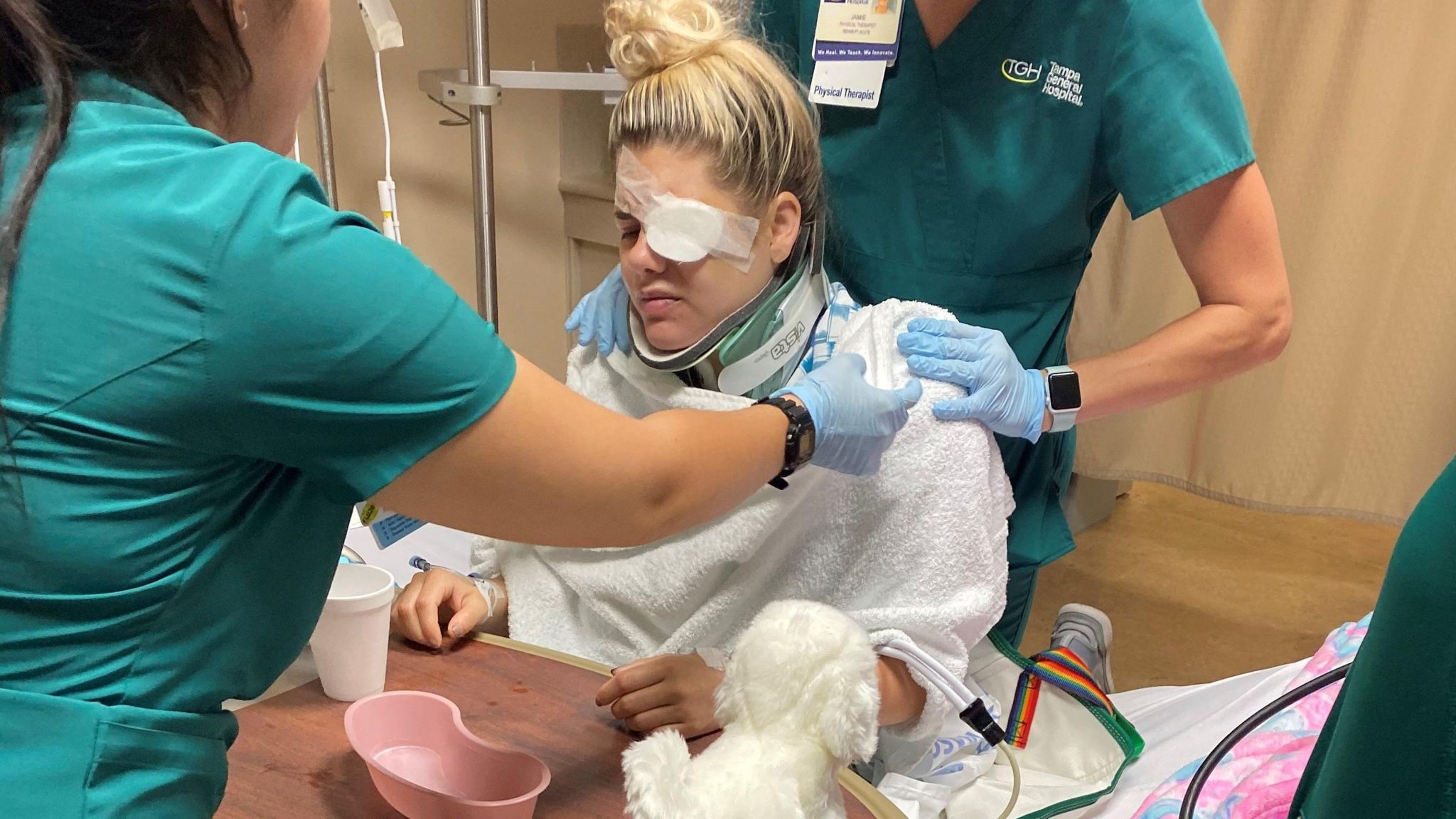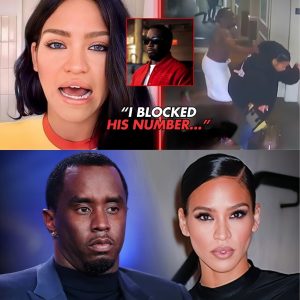This article contains descriptions and details of domestic violence. If you have been affected by any of the issues raised, BBC Action Line can provide contacts to find help.

Tracy Otto was just tucking into her lunch when she was surprised by the news that she is going to the Paralympics.
“They gave Ricky [Riessle], my boyfriend, this box with a hat in it, saying you’re qualified,” the 28-year-old tells BBC Sport.
“When he presented it to me I was eating, I had food in my mouth. So I was eating and crying, and there were cameras everywhere.”
Otto had been selected for the United States archery team at Paris 2024, where she will shoot in both the mixed teams with partner Jason Tabansky and in qualification for the W1 open individuals competition.
“It’s so cool,” Otto says from her Tampa home with a gigantic grin on her face.
“From being on my deathbed to the Paralympics is just a crazy journey. I am in awe of myself and my team.”
Otto is not exaggerating when she talks about being on her deathbed.
In October 2019, Otto was attacked at her home by her ex-boyfriend.
She was left paralysed from the chest down with limited use of her arms and hands, and lost her left eye. She can also no longer sweat or regulate her body temperature properly.
Otto is willing to talk about the night which changed her life in remarkably honest detail in order, in her own words, to “be a light, a beacon of hope in this world”. She wants to let other women who have suffered violence at the hands of a partner or an ex know they are not alone.
‘He tells us that he’s going to kill us’
In September 2019, Otto broke up with a boyfriend. A month previously, he had been arrested for attacking her at their home in Riverview, Florida.
Otto was ready to move on with her life, and had met someone new.
“I had just started talking to Ricky,” she told the BBC World Service’s Sportshour programme. “We met on 26 September 2019, and we went on a couple of dates.
“I had broken up with my ex, kicked him out, told him to leave, he gathered all of his things, he was gone and I had changed all of the locks on my house. Everything was done.
“That night it was 24 October 2019, we had another little date, and we go off to bed. I remember rolling over and getting comfortable in bed and drifting off to sleep.
“And then all of a sudden, I hear this loud noise and I see a flashlight in my face and I was so confused.
“And then I heard his voice, and I realised it was my ex.
“He had parked his car at the front of my house, went around the back of the house and looked through my bedroom window. We were sleeping, and he had decided to go to purchase a high-powered pellet gun.
“He did the best that he could to get as close to a real gun as possible. And a knife and a set of handcuffs.
“And he comes back to my house, breaks in and wakes us up, screaming at us to get out of bed.
“He tells us that he’s going to kill us and that if he didn’t kill himself, he was going to call the police.
“So, he outright told us what he was going to do. This is where everything gets kind of blurry because it happened so quickly. I can tell you what I know happened, I just don’t have it first hand because my brain just kind of blocked everything out.”
The attacker punched Otto multiple times before shooting Riessle twice in the face and stabbing him in the back, causing his lung to collapse.
He then shot Otto through the left eye, before stabbing her in the back of the neck, leaving her paralysed. He then sexually assaulted her.
“And he ends up calling the police on himself and tells them that ‘this is my name, ‘this is where I’m at’. He calls me his girlfriend, but then later admits to the police that we had broken up,” Otto says.
“And he was like, ‘I just killed my girlfriend and her new boyfriend’. They show up, he’s sitting in the driveway, and he gets taken away.”
In January 2023, the ex-boyfriend pleaded guilty to two counts of burglary with assault, two counts of attempted murder in the first degree, one count of sexual battery and two counts of aggravated bodily harm.
He was sentenced to 40 years in jail.
‘I can’t sweat any more’
The attack changed Otto’s life forever. Nearly five years on, she is still re-learning how her body works.
“It’s more than just the paralysis and the wheelchair that you see on the outside, there’s a lot going on the inside that doesn’t function any more,” she says.
“So, for example, my diaphragm is paralysed as well, my body doesn’t also regulate its temperature any more. I can’t thermally regulate, and that means I can’t sweat any more.
“So, if I sit out in the sun, like I do for archery, my body and my internal temperature gets incredibly high, so we have to do everything that we can to make sure I don’t overheat and have a heatstroke.
“And there’s also bowel and bladder issues where that doesn’t function any more, so I have to find alternate ways of relieving myself.
“Because my brain can’t communicate with the rest of my body, if something is wrong below my level of injury, I can’t feel it. And it can be literally anything.
“I could have to go to the bathroom, I could have a scratch, my clothes may be too tight, I could have an ingrown toenail, anything.
“If something happens below my level of injury that’s an unwanted stimuli, my body immediately goes into fight-or-flight mode and escalates my blood pressure.
“That’s my body’s way of saying ‘hey, something is wrong’ but it gets dangerously high, and I can have a seizure, heart attack, stroke and ultimately die within minutes. And it can happen at any time.”
For most people, just attempting to return to everyday life after something so traumatic would be enough. But Otto, formerly an aspiring fitness model, wanted to get back to being active.
So, in March 2021, she picked up a sport she had never tried before on a whim.
“I was in the car with Ricky, thinking about how I had lots of time on my hands – I can’t work traditional jobs any more,” she says.
“And I just thought, why not try archery? Ricky was like, ‘your hands don’t work’, but I just thought we’d figure it out. I did some research and found we have an adaptive archery course in our area. A week later I was shooting for the first time.”
Because of her disabilities, Otto has to shoot with a specially designed harness. She used to release arrows from her right shoulder, but now uses her mouth.
“I have an adaptive release that is on my wrist – it has a cable that goes up in through my hat and has a closed pin-type apparatus that I bite down on when I’m ready to release the arrow,” she says.
“And then I have a hat and glove that allows me to be able to hold the bow so I don’t drop it when I release the arrow.”
Otto says she hit the target with the first arrow she ever shot, and was hooked.
‘My life is so much more colourful and full of love’
Soon, she had major ambitions.
“I wanted to go for Paralympics right away. In my second week of practice I was asking, ‘what does competing look like?’” she says.
Otto was soon touring the country, taking part in qualifying tournaments. As the only female American archer in her Paralympic category, she had to meet a minimum score – shooting 72 arrows, she needed 520 points from 720.
She hit that mark last summer, and confirmed her passage to Paris in a three-stage series earlier this year, culminating on home turf in Florida, and that surprise celebration over lunch.
Otto is very frank about what happened to her, and the struggles she faces in everyday life. But the Floridian is a vibrant and unabashed character who refuses to be cowed by the man who tried to take everything from her.
“I’ve had this feeling that there is a bigger picture about this situation,” she says.
“I have always wanted to leave an impact on this world, and be a light. There is so much darkness and hate, I can’t justify not talking about and being an example for people hurt like me.
“I can’t just lie down and take it, lie down and die.
“Honestly it’s exhausting. I’m very lucky that I have Ricky to help me, to make sure I am OK. But it is really hard, even picking something up, it reminds me of what happened to me. Your body does not work any more in the way it should.
“But there is a light at the end of the tunnel, and that is that I worked through it and have learned so much about it along the way.
“My life is so much better now, much more colourful and full of love and laughter than it was before.”






